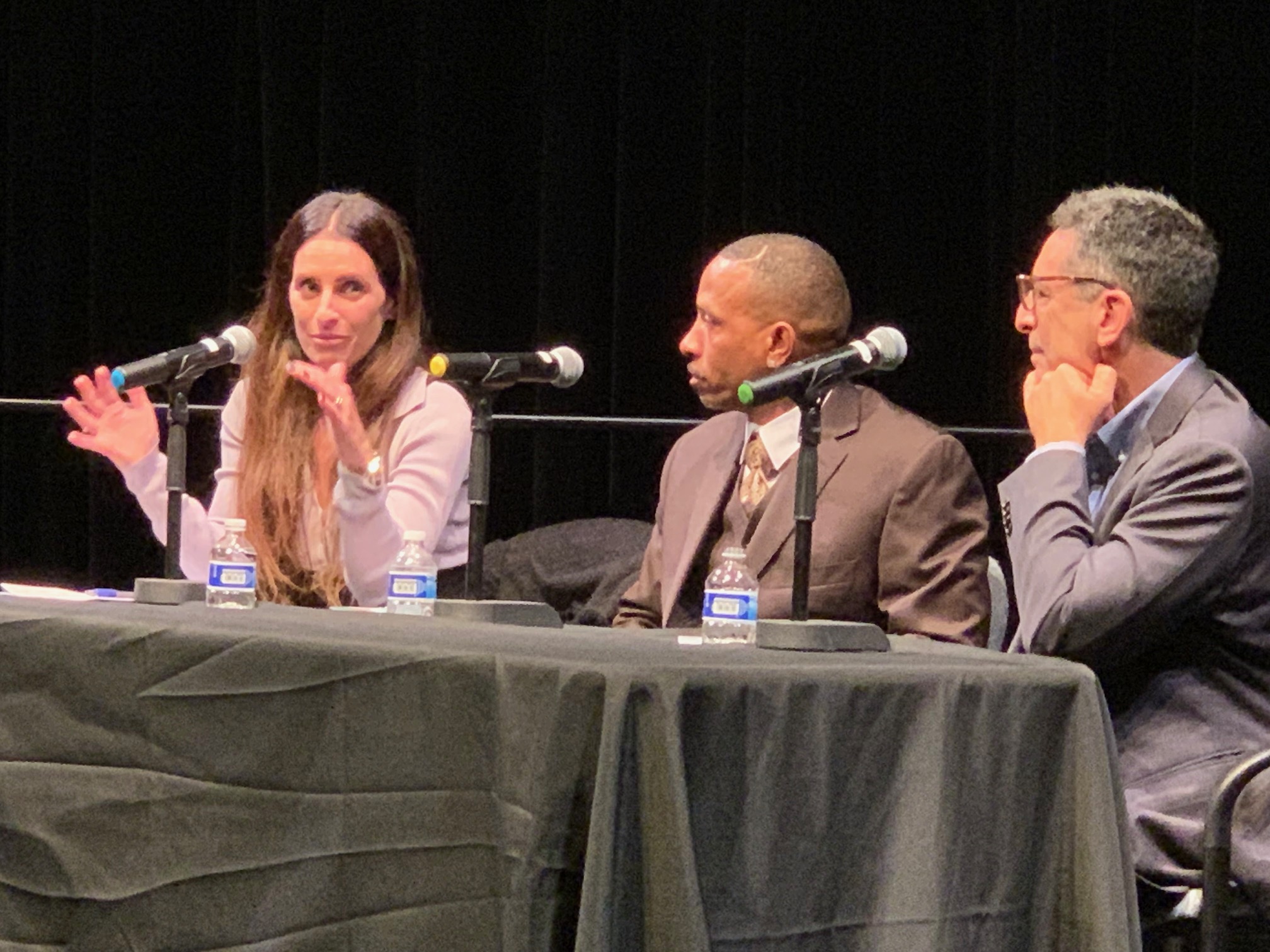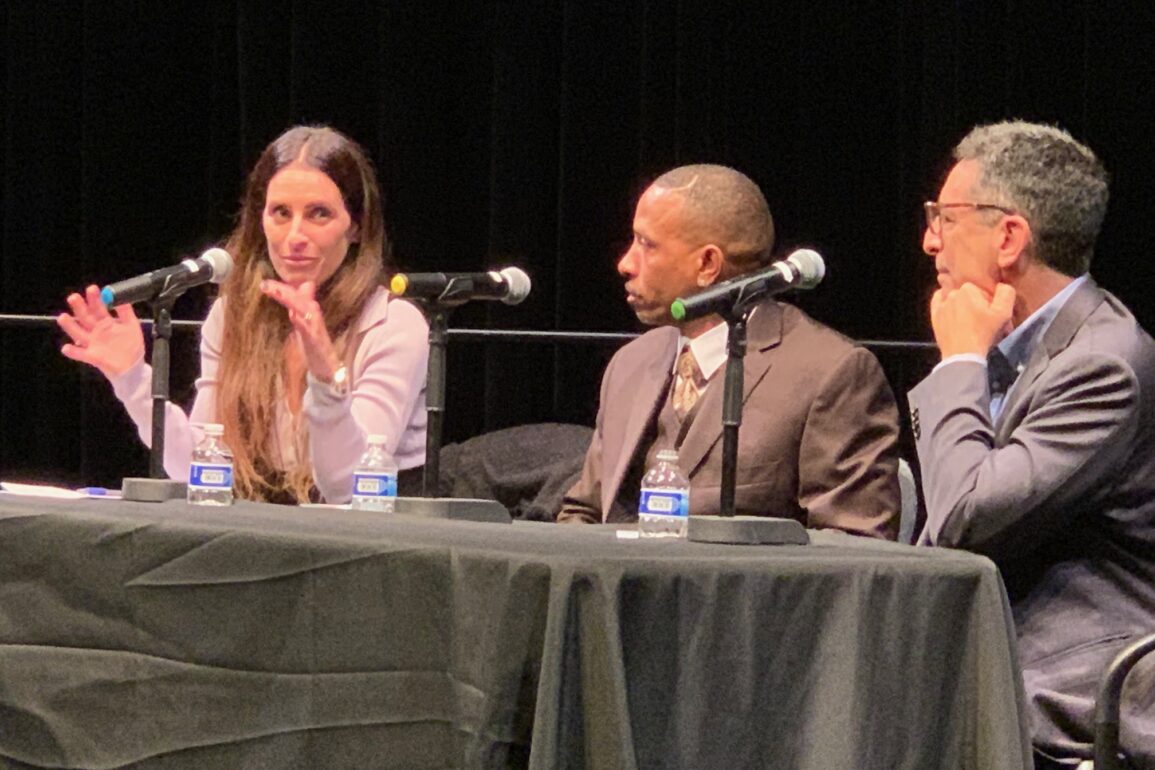
Rick Walker spent 12 years in prison for a crime he did not commit. Exonerated in 2003, Walker left prison as a free man but without a home, job or any support from the state.
This year marks the 20th anniversary of Walker’s release. Much has changed in the criminal justice system since then; in part by the efforts of legal experts, legislators and exonerees, like Walker, who have advocated for policy reforms to redress past injustices.
On Wednesday evening, Oct. 4, the city of Mountain View and Santa Clara County Supervisor Joe Simitian commemorated this work with a documentary, “$100-a-Day,” and panel discussion about wrongful incarceration at the Mountain View Center for the Performing Arts.
The event – attended by about 85 people including city council members from Mountain View, East Palo Alto, Cupertino and Los Gatos – opened with remarks by Simitian who encouraged the audience to think about why the issue of wrongful incarceration, 20 years later, was still a part of the national conversation.
The documentary featured the story of Walker, an East Palo Alto resident, who was wrongfully convicted of murder in 1991 and served 12 years in prison even though he was innocent. But the injustices did not end there. After his release from prison, Walker struggled to receive the compensation that the state owed him, which was $100 for every day he spent in prison.
Simitian, who was a state Assembly member at the time, took up the cause and authored a bill, AB 1302, to expedite compensation specifically for Walker. The bill squeaked through at the eleventh hour, gaining more than the necessary two-thirds majority in an extremely partisan chamber that did not pass any other legislation that night.
“He changed my life,” Walker said in the film. “And he changed my views as well about politics and politicians and what goes on in Sacramento. It basically changed the way I think about that whole system. There is something there. There is a light in there. It’s not total darkness.”
This glimmer of hope, that a flawed system could be made to work better, was the focus of the panel discussion that followed. Melissa O’Connell, co-legal director and policy liaison for the Northern California Innocence Project, highlighted numerous policy updates that have occurred since the passage of AB 1302.
“There has been bipartisan support of nearly 10 pieces of legislation over the last 20 years related to compensation of the wrongfully convicted in the state of California, which is just remarkable,” O’Connell said, adding that in 2015, compensation for exonerees was increased to $140 a day.
Obie Anthony, founder and director of Exonerated Nation, addressed the issue from personal experience. Like Walker, Anthony was convicted of a crime he did not commit. When he was 19-years-old, Anthony was arrested and served 17 years in prison before he was exonerated.
Anthony described the difficulties of returning home as an exoneree with no support system in place. When parolees leave prison, they are provided with a small amount of money and some social service assistance. But nothing existed for exonerees, like Anthony and Walker.
“When we came home, a big door closed behind us. There was no system for us. So, me and Walker set out to create this system to catch us individuals when we walk out the door,” Anthony said.
Walker died in 2020 from COVID-19, but his advocacy worked has carried on.
Since 2015, Exonerated Nation has contributed to a wide range of legislation that has helped exonerees with compensation, housing, education and health services. Giving teeth to prosecutorial misconduct, Exonerated Nation also co-authored a bill, AB 1909, that expands the classification of a “peace officer” and makes it a felony for prosecutors to intentionally and in bad faith withhold evidence of a person’s innocence.
Santa Clara County Deputy District Attorney David Angel, who has exonerated six people wrongfully convicted of crimes, acknowledged that prosecutorial misconduct happens in the legal system. But he also said that wrongful convictions typically are not the result of one “bad apple” but rather the result of systemic biases and unintentional mistakes.
“There’s a whole bunch of things that go wrong at once. So, there are those mistakes that are always going to be there,” Angel said, adding that it was important for people in positions of power to have humility, “to know that you could be wrong and not know you’re wrong.”
To mitigate these issues, Angel described ways that Santa Clara County works with organizations, like the Innocence Project, to “road-test” new methods and techniques that then lead to reforms in the criminal justice system.
O’Connell also raised the need for prosecutorial offices to conduct audits of their work when something goes wrong. While this occasionally happens, it is not a systemic practice, she said.
Attendees similarly pressed for more transparency and accountability in the criminal justice system, with several noting the disproportionate effects of incarceration on black and brown communities.
“It doesn’t take much to look at our system and know that it’s racist,” O’Connell said in response to these comments, adding that the faces of wrongful conviction are similar to the faces of incarceration.
East Palo Alto Mayor Lisa Gauthier stood up and said that as a black mother, she always worried about her son coming home safely. She asked Anthony what advice he would give to his younger self and to other black and brown men who often are viewed as guilty, and treated as such by society, because of the color of their skin.
Anthony paused for a moment before responding. “One of the things that I most likely would say to myself, to my little (child), and to the community at large (is) ‘You’re not disposable. You’re not a disposable person,'” he said. “So, treat yourself as such. I would remind myself to remember my self-worth.”
This post was originally published on this site be sure to check out more of their content.







